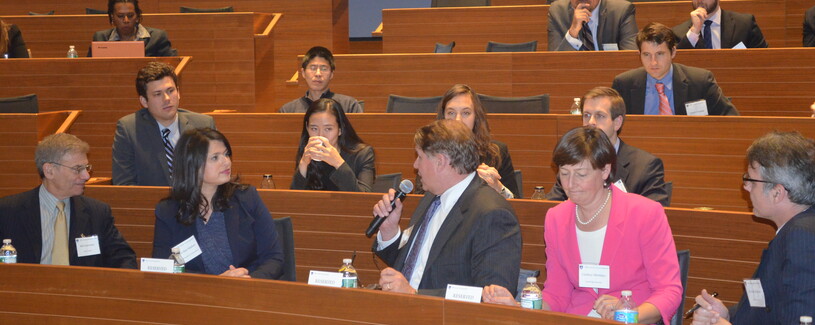Sometimes It's All About Timing
Notes from Yale's Inaugural Low Carbon Case Competition

Notes from Yale's Inaugural Low Carbon Case Competition
On the heels of the US-China Summit and two pivotal divestment announcements from Sweden’s national pension fund and Rockefeller Brothers Fund, the Yale School of Management hosted its inaugural Low-Carbon Portfolio Case Competition on Friday November 14th. Over 120 people attended the conference, with 11 student teams participating, to examine options for institutions and investment managers and consultants to consider reducing the carbon embedded in institutional portfolios.
While low carbon investing is typically discussed through the perspective of divestment, it is rarely analyzed through the lens of asset allocation and portfolio strategy. To address this topic, a unique case study was developed at Yale, which engaged top MBA programs from across the country.
Finalist teams had the opportunity to pitch their ideas to a suite of expert judges led by Bob Litterman, Chairman of the Risk Committee at Kepos Capital, and former head of risk management at Goldman Sachs. “It was great to see so many thought leaders in one room discussing low carbon investment strategies, and overall I was very impressed with the caliber of ideas that the student teams presented,” Litterman said.
The case revolved around a fictitious endowment called Gifford Pinchot State University, which was facing student activism to divest from the Carbon Tracker’s Top 200 Fossil Fuel stocks. The key challenge presented to the teams was: what position should the university take on the issue? MBA students acted as advisors of the firm Commonfund, an institutional investment firm that manages $25 billion for over 1,300 institutions, and main sponsor for the event. The winning team took home a grand prize of $10,000 and now have the opportunity to present their findings at a Commonfund gathering in Florida in March 2015.
To gain insights for the case, teams pored over data regarding the university’s asset allocation strategy. The runner-up team from the Yale School of Management recommended a phased divestment approach where fossil fuel companies would have to meet a clear set of criteria in order to stay in the portfolio. Additionally, their solution was strengthened by the application of pressure on fossil fuel companies through the formation of a university alliances and the filing of shareholder resolutions to draw a stake in the ground.
The winning team from New York University’s Stern School of Business, carried out extensive financial modelling that took into account various regulatory scenarios and valued market pricing of fossil fuel securities over time. Their analysis implied that the stock prices of these companies were overvalued, and the risks from climate impact, regulatory policy and technology were being discounted by the market. Their final recommendation was for Gifford Pinchot State University to divest due to their analysis that fossil fuel securities inordinately increased the portfolio’s risk.
“Thanks to Yale hosting such a fantastic event, we were able to share our view that endowments and pension funds shouldn't try and time the market re-pricing of fossil fuel risk," says Dillon Ripley Lanius, a first year MBA candidate at the NYU Stern School of Business.
The event, only in its first iteration, was hailed as a success from various parts of the Yale community. In reference to The Ethical Investor, a book written by Yale professors and graduate students in 1972, the Yale Climate & Energy Institute wrote, “A national low-carbon investment case competition sponsored by the Yale School of Management in November marks a new first for Yale, and a homecoming for the practice of socially responsible investment.”
The organizers of the event hope to convert their success and momentum into a tradition by bringing issues on the forefront of sustainability out onto the public forum as an annual event. Logan, says, “ultimately, we hope Yale will continue to convene thought leaders around salient issues of responsible investing and figuring out creative ways to channel the capital markets into investments that have positive financial, social and environmental outcomes.”
For more information please visit: http://som.yale.edu/event/2014/11/inaugural-national-low-carbon-case-competition
Watch the morning keynote given by Kenneth Gillingham, Assistant Professor of Economics, Yale University
Watch the Finalist pitches
Watch the afternoon keynote given by Peter Knight, Founding Partner & President of Generation Investment Management